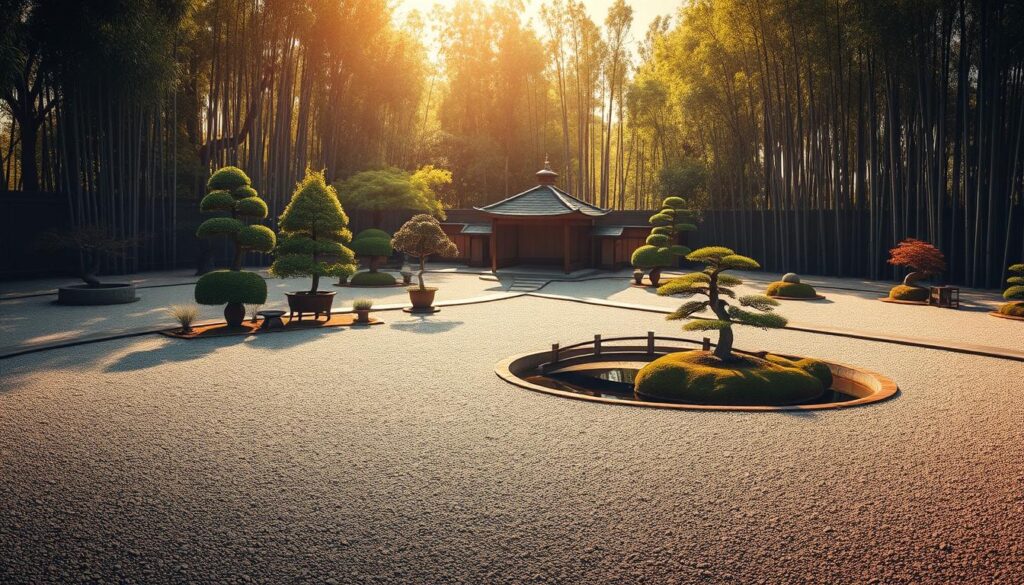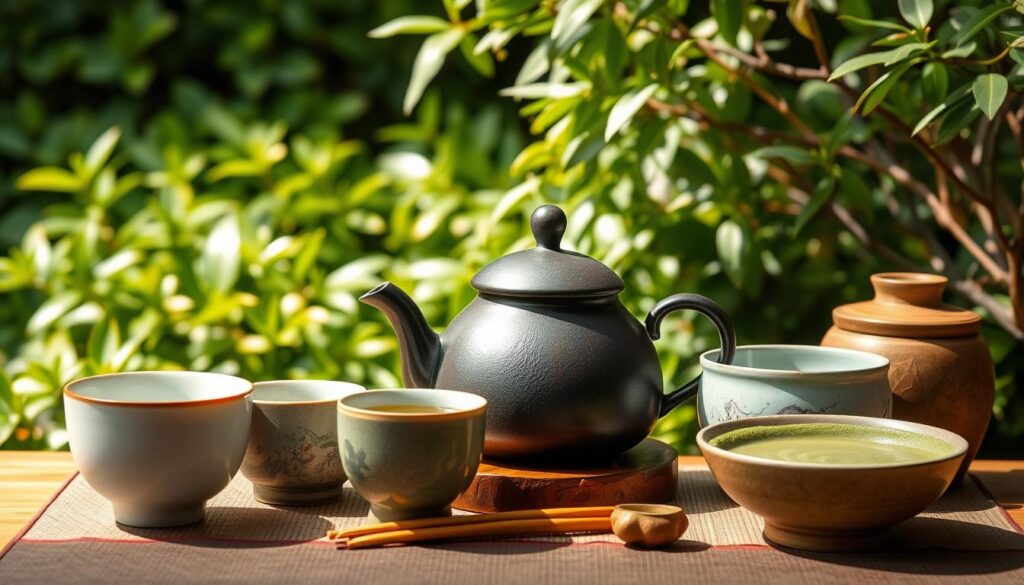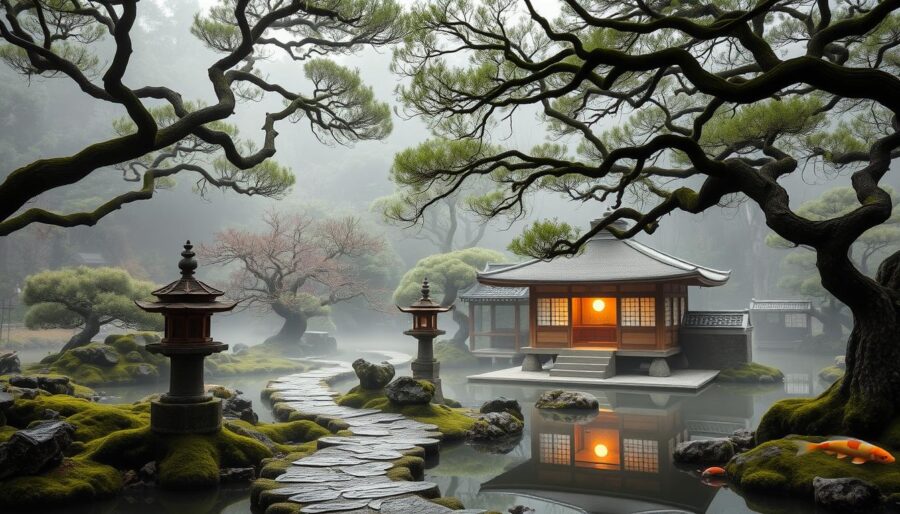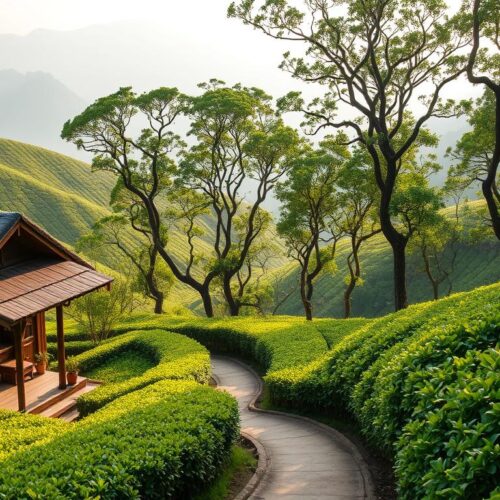Our world is fast and often lacks calmness. Yet, Japan offers a unique mix of traditions that bring peace. These include the calming practice of tea and the serene Zen gardens. This magical place encourages you to experience mindful travel. Here, you can enjoy the gentle ritual of Japanese tea within the peaceful Zen gardens. This journey shows how these deep-rooted traditions foster mindfulness and self-reflection. They are key to finding your inner peace. Let’s explore the beautiful blend of tea and Zen gardens in Japan together.
The Essence of Tea in Japanese Culture
The story of Japanese tea starts with its ancient Chinese origins. By the 8th century, it had become key in Japanese life. Tea in Japan is more than a drink. It’s part of a tea tradition that mixes with social and spiritual aspects. The impact of tea on Japanese culture is huge, shaping rituals, social events, and moments for reflection.
In Japan, tea ceremonies show the importance of harmony, respect, and being mindful. These ceremonies are not just about making tea. They are also about bringing people together in thoughtfulness. Through time, Zen monks and the upper class have shaped these tea traditions. Today, they define how tea is celebrated.
When looking at tea’s cultural role, consider the variety of teas and how they’re made. Take matcha, for example. The care put into making each cup showcases the skill involved. This dedication shows a deep respect for nature and how everything is connected.
The table below shows different parts of Japanese tea and its traditions:
| Aspect | Description |
|---|---|
| Origin | Introduced from China in the 8th century |
| Tea Types | Green tea, sencha, matcha, and hojicha |
| Ceremonial Practice | Focused on mindfulness, respect, and harmony |
| Key Values | Interconnectedness, tranquility, and craftsmanship |
| Societal Roles | Cultural gatherings, monk rituals, and social engagements |
Understanding Zen Gardens
Zen gardens are a key part of Japanese culture. They began in the 7th century. Over time, they became a reflection of Zen Buddhism. Their simple look helps bring peace and helps with meditation.
Every part of a Zen garden means something. Rocks are like mountains and sand stands for water. Plants bring a feeling of being one with nature. The design makes you think and find deeper meaning. Places like Ryoan-ji show how simple and complex can mix.
Getting to know Zen gardens is more than just liking how they look. It’s about connecting with their deep meanings. Being in these gardens lets you feel the calm and purpose they have. This shows a special part of Japanese tradition.
The Connection Between Tea and Zen Gardens
Exploring how tea and zen gardens connect shows their deep cultural and spiritual roots. In Japan, roji tea gardens are key. They lead visitors from chaos into calm tea rooms. The paths in the roji bring peace, readying you for mindful tea meditation.
Walking through a roji, you deeply feel nature. Every step on its paths brings you closer to the now. The simple beauty of these gardens, like the tea ceremonies, helps focus your mind. Making and enjoying tea turns into a spiritual act, echoing zen garden meditation.
Tea and zen gardens both symbolize peace, teaching harmony with nature. They show the value of simplicity and purposeful actions. By having tea in zen gardens, you practice mindfulness. This helps you find inner peace.
| Element | Tea Ceremony | Zen Garden |
|---|---|---|
| Purpose | Fostering mindfulness and focus | Creating a serene environment for reflection |
| Design | Intricate tea utensils and presentation | Thoughtfully arranged rocks, plants, and pathways |
| Experience | Engagement in sensory experiences with tea | Interaction with natural elements to inspire calm |
Designing Your Own Zen Garden
Creating a DIY Zen garden is a fulfilling project. It fosters personal peace and brings nature into your space. Start by choosing a calm spot in your yard or on a balcony. This area should be quiet and easy to get to, perfect for quiet moments.

Then, think about the materials for your Zen garden. Gravel is a great base and feels nice underfoot. Pick stones that you like, from smooth pebbles to jagged rocks. They represent different parts of nature. Choose plants that do well in your area and add calm to the garden.
How you arrange everything is key. Try to make it look like natural landscapes with your stones and plants. Adding patterns in the sand with raked lines can mean a lot, like water ripples. This symbolism makes your Zen garden more than just pretty but a step towards being mindful.
Finally, here are some tips to keep your garden looking great. Rake the sand or gravel often to keep up your patterns. Take care of the plants to keep your garden vibrant. Design a space that feels right to you, making your Zen garden a personal haven for rest and renewal.
The Art of Japanese Tea Ceremonies
Japanese tea ceremonies are a deep cultural practice, filled with history and meaning. They go beyond just drinking tea; they’re a form of meditation. These ceremonies focus on harmony, respect, purity, and peace. The way tea is made is key, showing great care from beginning to end.
These ceremonies happen in calm tea rooms, designed to help people be mindful. The tools for the tea ceremony are chosen with care. Each item, like bamboo scoops and whisk, adds to the beauty. They show the values of Japanese culture.
The steps of the ceremony show love for simplicity and beauty. Water is first heated just right, then mixed with matcha. This mix creates a smooth tea. It reminds us to slow down and enjoy now, bringing peace inside us.
When the tea is ready, it’s more than a drink. It’s a tradition shared, bringing people together. Being part of a tea ceremony is about connecting with others and finding calm.
The Role of Nature in Zen Practices
Zen philosophy shows a deep bond between humans and nature. This bond is vital in Zen, with nature forming a calm backdrop for meditation and mindfulness. Zen gardens, designed to reflect nature’s beauty, play a key part in Zen practices.
Being in these gardens makes you think deeply. You see rocks, gravel, and plants arranged to make you reflect. This setup, resembling natural beauty, teaches the value of simplicity and balance.
Nature helps us find inner peace and balance. Engaging with nature calms the mind and promotes spiritual growth. This connection enhances mindfulness, making us appreciate the beauty around us and our role in it.
Benefits of Combining Tea and Zen Gardens
Mixing tea time with Zen gardens adds great value to our health and peace of mind. Tea is known for calming us down. Drinking teas like chamomile or green tea helps with relaxation and lowers stress. This fits well with the quiet vibe of Zen gardens, which help us focus on the moment.
Putting these practices together makes a perfect spot for thinking deeply. Sipping tea in a Zen garden helps us dive into a peaceful state. The beauty of the garden adds to this feeling, making us more at peace.
Studies show that drinking tea and spending time in Zen gardens are good for us. Doing both regularly helps us relax and leads to a calmer lifestyle. Learning about the Zen benefits of this mix can bring us closer to peace and emotional wellbeing.
Exploring Different Types of Tea
Japanese tea culture is rich in different flavors, smells, and traditions. Matcha tea is famous for its bright green color and special way of making it. Instead of just steeping, you whisk matcha powder with hot water. This creates a frothy drink full of antioxidants.
Sencha is another well-loved Japanese tea. It’s steamed when made, which gives it a fresh, grassy taste. People in Japan drink sencha hot or cold, nearly every day. It’s a big part of their daily lives.
Hojicha is known for its roasting process, which gives it a toasty flavor and less caffeine. It’s perfect for drinking in the evening because it helps you relax. If you like a nutty flavor, try genmaicha. It’s a mix of sencha and roasted brown rice. This tea has a nice blend of sweet and nutty tastes.
Drinking these teas is about more than just taste. They’re important in Japanese tea ceremonies and traditions. Each tea has its own culture significance and health perks. Drinking tea is a mindful practice and an art. When you pay attention to how they’re made and tasted, you discover a deep sense of peace and focus.

Visiting Zen Gardens in Japan
Visiting Japanese Zen gardens is a special chance to experience peace and beauty. The gardens in Kyoto are world-famous for their beautiful designs and calm vibes. They draw tourists from everywhere. Follow some travel tips to make your visit better and deeply feel the peace they offer.
Ryoan-ji is a well-known Zen garden, famous for its simple rock setup with 15 stones. Go early in the morning to enjoy the quietness without the crowds. Daitoku-ji, another key garden in Kyoto, has many smaller temples each offering a different view and feel. These places help you connect with nature in a personal way.
Taking part in a tea ceremony near the gardens can make your experience richer. It blends the calm of Zen gardens with the joy of Japanese tea traditions. Look up ceremonies before you go to choose one that fits you best.
Remember to be respectful when you visit these ancient sites. Speak softly and avoid causing any disturbance. This helps keep the peace. Let go of everyday stress as you explore. The calm of Zen gardens offers a rare peace and balance to your journey in Japan.
The Influence of Zen Gardens on Interior Design
Zen gardens have shaped modern interior design, adding simplicity and peace. They teach us how to make living spaces serene. Minimalist elements turn your home into a calm haven.
Natural materials are key for a peaceful vibe. Wood, stone, and plants bring harmony, mirroring Zen gardens. Adding indoor gardens or water features brings outdoor tranquility inside. They boost well-being and look good too.
Here’s how Zen aesthetics change interior design, through a comparison:
| Design Element | Zen Garden Influence | Minimalist Design Aspect |
|---|---|---|
| Indoor Gardens | Creates a calming focus point | Emphasizes simplicity by using low-maintenance plants |
| Water Features | Enhances tranquility and relaxation | Minimalist design promotes clean lines and uncluttered spaces |
| Natural Lighting | Brings the outdoors inside, mimicking nature | Simple window treatments maintain an open, airy feel |
| Earthy Color Palettes | Promotes calmness through the use of greens and browns | Focuses on muted tones for a clean, spacious environment |
Zen aesthetics in your home leads to peace. Acknowledging Zen gardens lets us create beautiful, healing spaces.
Tea, Zen, and Health Benefits
Drinking tea and meditating both offer great health perks, enhancing overall wellness. Tea is loaded with antioxidants. These help fight oxidative stress and boost physical health. Studies show green tea can reduce the risk of chronic illnesses thanks to its healthy compounds. Adding this calming drink to your daily life is a refreshing way to support your health.
Meditation, part of Zen traditions, has many mental benefits. It lowers stress, anxiety, and depression, promoting peace and clear thinking. By meditating, you can handle your thoughts and feelings better. This practice adds to the health perks of tea, leading to full wellness.
When you mix tea drinking with meditation, the benefits grow. Enjoying a soothing tea while meditating makes the experience even better. It also boosts the health benefits of both practices. Spending time in a peaceful spot, like a Zen garden, makes these moments more meaningful, bringing insights and refreshment.
Conclusion: Embracing Serenity in Your Life
Reflecting on tea and Zen gardens shows how they are key in finding serenity. The quiet of a Zen garden and the act of making tea create peace and reflection. Adding these into your daily life brings balance in today’s busy world.
Practicing mindfulness with tea and Zen gardens helps escape stress. It makes us appreciate the now, surrounding beauty, and calm. Enjoying tea and time in your garden can be like meditating, making life richer.
Zen principles and tea rituals mean more than just beauty; they lead to inner peace. By including them in your routine, you turn your life into a sanctuary of calm. This helps deal with life’s ups and downs smoothly. Let this journey bring you a mindful, peaceful life.




